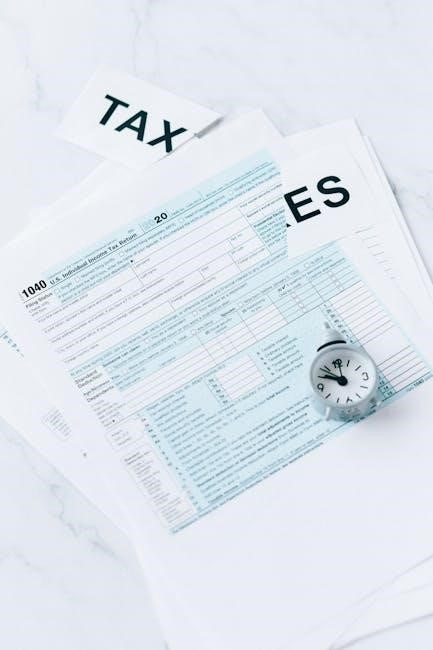Overview of the NJ Inheritance Waiver Tax Form 01 (PDF)
The NJ Inheritance Waiver Tax Form 01 (PDF) is a legal document enabling beneficiaries to transfer assets without inheritance tax, specifically for Class A beneficiaries when no tax is due․ It streamlines estate asset transfers under specific conditions, ensuring compliance with New Jersey tax regulations․ The form must be submitted accurately to facilitate the release of funds or property․
Purpose and Function
The NJ Inheritance Waiver Tax Form 01 (PDF) serves as a legal document granting beneficiaries the authority to transfer assets from a decedent’s estate without incurring inheritance tax․ Its primary purpose is to streamline the process of releasing funds or property, ensuring compliance with New Jersey tax laws․ The form is specifically designed for cases where no inheritance tax is owed, typically applicable to Class A beneficiaries․ It acts as written consent from the Director of the Division of Taxation, allowing the transfer of assets such as real estate, bank accounts, or securities․ The form must be filed with the County Clerk’s office to finalize the asset transfer process․
Key Benefits for Beneficiaries
The NJ Inheritance Waiver Tax Form 01 (PDF) provides several key benefits for beneficiaries, primarily eliminating the need to pay inheritance tax when no tax is due․ It simplifies the asset transfer process, allowing beneficiaries to access funds or property quickly and efficiently․ The form ensures legal compliance, protecting beneficiaries from potential disputes or penalties․ By streamlining the transfer process, it reduces administrative burdens and costs․ Additionally, it offers transparency, providing clear documentation of the asset transfer․ This makes it an essential tool for beneficiaries, especially Class A beneficiaries, to manage estate distributions smoothly and avoid delays․
Types of Inheritance Tax Waivers in New Jersey
New Jersey offers three primary inheritance tax waivers: Form IT-R for all asset transfers, Form L-8 for non-real estate assets, and Form L-9 for real estate transactions․
Form IT-R: Transfer Inheritance Tax Waiver
Form IT-R is a Transfer Inheritance Tax Waiver used to release funds or assets from bank accounts, investments, or real estate․ It allows beneficiaries to transfer assets without paying inheritance tax when no tax is due; This form is essential for executors or beneficiaries to facilitate the transfer of deceased individuals’ assets․ It covers all types of assets, ensuring compliance with New Jersey tax regulations․ The form must be submitted accurately, along with required documentation, to avoid delays․ It is a critical step in the estate settlement process, enabling smooth asset distribution to beneficiaries while adhering to legal requirements․
Form L-8: Release of Non-Real Estate Assets
Form L-8 is specifically designed for the release of non-real estate assets, such as bank accounts, investments, and stocks․ It allows beneficiaries or executors to transfer these assets without incurring inheritance tax when no tax is due․ This form is particularly useful for streamlined asset distribution, ensuring compliance with New Jersey tax regulations․ It is often used for Class A beneficiaries, such as spouses, children, or parents, who are exempt from inheritance tax under certain conditions․ The form simplifies the process of releasing funds held in financial institutions, making it easier to distribute estate assets efficiently․
Form L-9: Real Estate Tax Waiver
Form L-9 is used to obtain a real estate tax waiver for transferring property located in New Jersey․ It is required when real estate assets are being transferred from a decedent to a beneficiary․ This form ensures that no inheritance tax is owed on the property and allows the release of any lien held by the state․ It must be submitted to the County Clerk’s Office and includes details about the property and the beneficiary․ The executor or beneficiary must sign the form, which is a critical step in the inheritance tax process for real estate assets in New Jersey․

Classes of Beneficiaries Eligible for the Waiver
Class A beneficiaries, including spouses, children, and parents, are eligible for the waiver when no inheritance tax is owed․ Other classes require specific conditions to qualify․
Class A Beneficiaries: Immediate Family Members
Class A beneficiaries include spouses, children, and parents of the decedent, who are eligible for the NJ Inheritance Waiver Tax Form 01 (PDF) when no inheritance tax is owed․ This classification streamlines the asset transfer process for immediate family members, ensuring compliance with New Jersey tax laws․ The form allows these beneficiaries to transfer assets without incurring inheritance tax, provided all requirements are met․ It is designed to simplify the process for close relatives, making it easier for them to manage the estate without additional financial burdens․ This classification is a key aspect of New Jersey’s inheritance tax regulations, aiming to protect immediate family members’ interests․
Other Beneficiary Classes and Their Requirements
Beyond Class A beneficiaries, other classes, such as Class B and Class C, have distinct requirements for the NJ Inheritance Waiver Tax Form 01 (PDF)․ These classes typically include more distant relatives or non-related beneficiaries, who must meet specific criteria to qualify for the waiver․ For instance, Class B may involve siblings or their descendants, while Class C could include other heirs like nieces, nephews, or unrelated individuals․ Each class has unique documentation and eligibility standards, ensuring compliance with New Jersey’s inheritance tax regulations․ These requirements help differentiate beneficiary rights and streamline the asset transfer process based on their relationship to the decedent․

Submission and Filing Process
The NJ Inheritance Waiver Tax Form 01 (PDF) can be submitted by mail to PO Box 690, Newark, NJ 07101-0690, or in person, requiring a self-addressed stamped envelope for processing․
Required Documentation and Cover Sheet
Filing the NJ Inheritance Waiver Tax Form 01 (PDF) requires a cover sheet, which must be completed accurately and submitted alongside the form․ The cover sheet provides essential details about the decedent, the estate, and the beneficiary․ It must include the decedent’s name, Social Security number, and dates of birth and death․ Additionally, a list of all assets being transferred must be provided․ Supporting documents, such as death certificates and appraisals of asset values, may also be required․ The cover sheet is available online and must be signed by the executor or beneficiary․ Proper documentation ensures timely processing of the waiver request․
Mail and In-Person Submission Options
The NJ Inheritance Waiver Tax Form 01 (PDF) must be submitted either by mail or in person․ For mail submissions, send the completed form and required documentation to PO Box 690, Newark, NJ 07101-0690․ Include a self-addressed, stamped envelope for receipt confirmation․ In-person submissions can be made at the County Clerk’s Office․ Ensure all forms are signed and notarized as required․ Certified mail is recommended for tracking purposes․ Proper submission ensures the waiver is processed efficiently, allowing beneficiaries to access estate assets without delays․ Always verify mailing addresses and office locations before submitting to avoid processing issues․

Legal and Tax Implications
The NJ Inheritance Waiver Tax Form 01 (PDF) ensures compliance with state tax laws, avoiding legal disputes․ A property lien remains until taxes are paid or secured, and waivers are only granted after tax obligations are met․ Proper filing prevents legal complications and ensures smooth asset transfers․
Property Lien and Tax Payment Requirements
A property lien is automatically imposed on all assets of the decedent for up to 15 years, ensuring inheritance tax payment․ This lien applies whether the tax is assessed or not․ To transfer property, the NJ Inheritance Waiver Tax Form 01 (PDF) must be filed, confirming tax compliance․ The lien is released only after taxes are paid or secured by a bond․ Beneficiaries cannot access assets until the state confirms payment or waiver approval, emphasizing the importance of prompt filing and payment to avoid delays in asset distribution․ Proper documentation ensures the lien is lifted, allowing smooth transfer of ownership․
Consequences of Late or Incorrect Filings
Late or incorrect submissions of the NJ Inheritance Waiver Tax Form 01 (PDF) can lead to penalties and interest on unpaid taxes․ The state may impose fines for non-compliance, delaying asset distribution․ Incorrect filings can result in additional reviews or rejections, requiring resubmission․ This extends processing times, leaving beneficiaries without access to funds or property․ In severe cases, unresolved issues may lead to legal action or prolonged estate administration․ Timely and accurate filing is critical to avoid these consequences and ensure smooth asset transfers․ Beneficiaries must address errors promptly to prevent further complications and maintain compliance with New Jersey tax regulations․

FAQs and Common Scenarios
Common questions include when a wavier is not required, typically for Class A beneficiaries with no tax due․ Overpayments are refunded to the estate, and executors must ensure accurate filings to avoid delays in asset distribution․
When Is a Waiver Not Required?
A wavier is not required when the decedent’s estate owes no inheritance tax, typically for Class A beneficiaries like spouses, children, or parents․ Estates valued below the exemption threshold ($716,000 in 2025) also don’t need a wavier․ Additionally, no wavier is required for non-resident decedents with no New Jersey assets or when transferring assets to charitable organizations or tax-exempt entities․ These scenarios simplify the process, eliminating the need for Form 0-1 and allowing direct asset distribution without tax implications․
Handling Overpayments and Refunds
If an estate overpays inheritance taxes, the excess amount is refunded to the estate account․ Refunds are typically processed within four months of filing the NJ Inheritance Tax Return․ Beneficiaries must ensure accurate documentation, including the waiver form, to avoid delays․ If no tax is due, a self-executing waiver (e․g․, Form L-8) allows direct asset distribution․ The state prioritizes timely refunds, but errors or incomplete filings can extend processing times․ Executors should maintain detailed records and consult tax professionals to navigate complex scenarios, ensuring compliance with New Jersey’s inheritance tax regulations and avoiding unnecessary complications․
The NJ Inheritance Waiver Tax Form 01 (PDF) is crucial for compliant asset transfers, ensuring tax obligations are met․ Accurate filing and professional advice are essential to avoid delays or penalties, safeguarding beneficiaries’ interests and streamlining estate distributions effectively․
Importance of Compliance and Professional Advice
Compliance with New Jersey inheritance tax regulations is critical to avoid penalties and ensure smooth asset transfers․ Professional advice from attorneys or tax experts is essential to navigate the complex process, especially for nuanced cases․ Accurate form submissions and adherence to deadlines prevent delays and legal issues․ Experts can address specific circumstances, such as overpayments or real estate transfers, ensuring all requirements are met․ Their guidance helps beneficiaries understand tax implications and liabilities, safeguarding their interests․ Timely and informed actions are vital to avoid costly mistakes and ensure the estate is distributed efficiently and in accordance with state laws․
